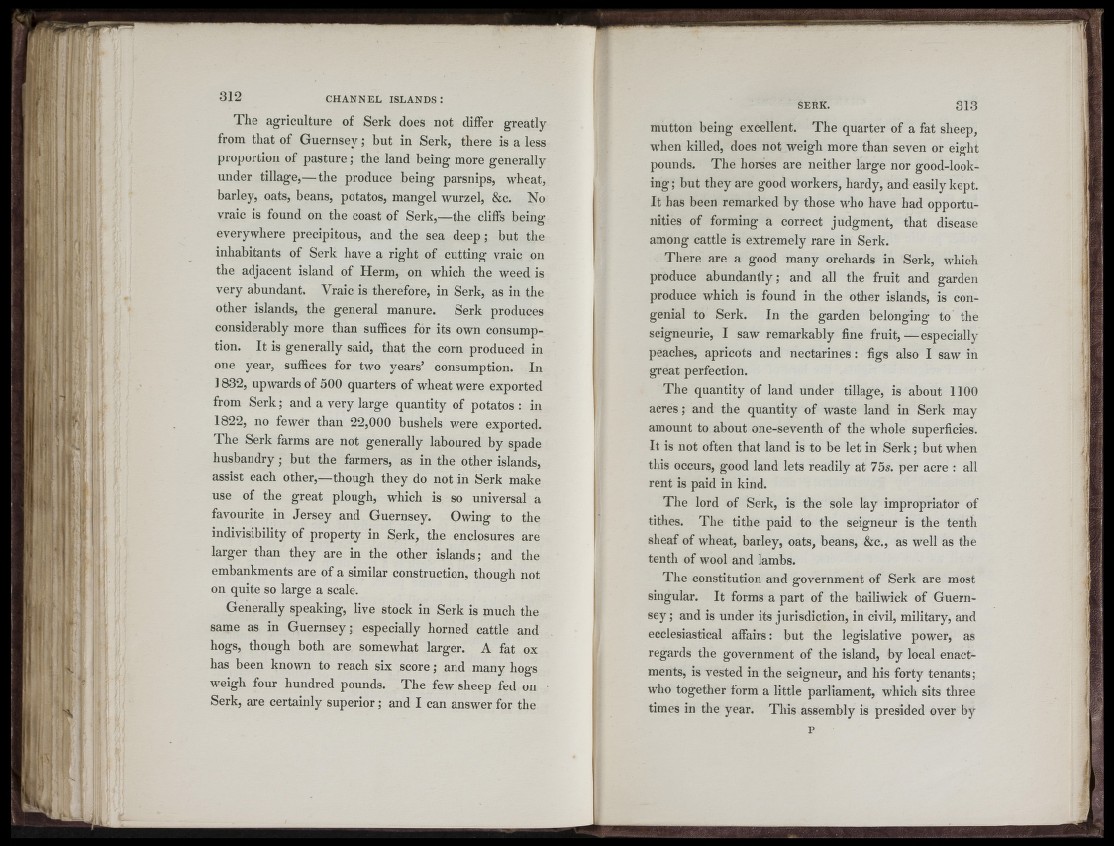
n iL x M
11;
1
',5
‘1I
i^Ti in r
|i!i
ML
(P>S■ Ti '
The agriculture of Serk does not differ greatly
from that of Guernsey; but in Serk, there is a less
proportion of pasture; the land being more generally
under tillage,— the produce being parsnips, wheat,
barley, oats, beans, potatos, mangel wurzel, &c. No
vraic is found on the coast of Serk,—the cliffs being
everywhere precipitous, and the sea deep; but the
inhabitants of Serk have a right of cutting vraic on
the adjacent island of Herm, on which the weed is
very abundant. Vraic is therefore, in Serk, as in the
other islands, the general manure. Serk produces
considerably more than suffices for its own consumption.
It is generally said, that the corn produced in
one year, suffices for two years’ consumption. In
1832, upwards of 500 quarters of wheat were exported
from Serk; and a very large quantity of potatos : in
1822, no fewer than 22,000 bushels were exported.
The Serk farms are not generally laboured by spade
husbandry; but the farmers, as in the other islands,
assist each other,—though they do not in Serk make
use of the great plough, which is so universal a
favourite in Jersey and Guernsey. Owing to the
indivisibility of property in Serk, the enclosures are
larger than they are in the other islands; and the
embankments are of a similar construction, though not
on quite so large a scale.
Generally speaking, live stock in Serk is much the
same as in Guernsey; especially horned cattle and
hogs, though both are somewhat larger. A fat ox
has been known to reach six score; and many hogs
weigh four hundred pounds. The few sheep fed on
Serk, are certainly superior; and I can answer for the
mutton being excellent. The quarter of a fat sheep,
when killed, does not weigh more than seven or eight
pounds. The horses are neither large nor good-looking;
but they are good workers, hardy, and easily kept.
It has been remarked by those Mffio have had opportunities
of forming a correct judgment, that disease
among cattle is extremely rare in Serk.
There are a good many orchards in Serk, which
produce abundantly; and all the fruit and garden
produce which is found in the other islands, is congenial
to Serk. In the garden belonging to the
seigneurie, I saw remarkably fine fru it,— especially
peaches, apricots and nectarines : figs also I saw in
great perfection.
The quantity of land under tillage, is about 1100
acres ; and the quantity of waste land in Serk may
amount to about one-seventh of the whole superficies.
It is not often that land is to be let in Serk ; but when
this occurs, good land lets readily at 75s. per acre : all
rent is paid in kind.
The lord of Serk, is the sole lay impropriator of
tithes. The tithe paid to the seigneur is the tenth
sheaf of wheat, barley, oats, beans, &c., as well as the
tenth of wool and lambs.
The constitution and government of Serk are most
singular. It forms a part of the bailiwick of Guernsey
; and is under its jurisdiction, in civil, military, and
ecclesiastical affairs : but the legislative power, as
regards the government of the island, by local enactments,
is vested in the seigneur, and his forty tenants;
who together form a little parliament, which sits three
times in the year. Tliis assembly is presided over bj--